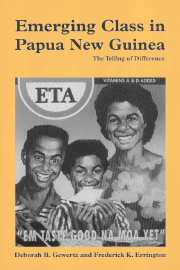Book contents
- Frontmatter
- Contents
- List of illustrations
- Acknowledgments
- Introduction: the twists and turns of difference
- 1 The middle class the (new) Melanesian way
- 2 How the grass roots became the poor
- 3 The realization of class exclusions
- 4 The hidden injuries of class
- 5 The problem(s) of the poor
- 6 Class and the definition of reasonability
- Conclusion: on dark nights of the soul
- Notes
- References
- Index
5 - The problem(s) of the poor
Published online by Cambridge University Press: 03 December 2009
- Frontmatter
- Contents
- List of illustrations
- Acknowledgments
- Introduction: the twists and turns of difference
- 1 The middle class the (new) Melanesian way
- 2 How the grass roots became the poor
- 3 The realization of class exclusions
- 4 The hidden injuries of class
- 5 The problem(s) of the poor
- 6 Class and the definition of reasonability
- Conclusion: on dark nights of the soul
- Notes
- References
- Index
Summary
Law, order, tinned mackerel and water buffalo
We have been writing about the complex engagements between rich and poor in a contemporary Papua New Guinea where class distinctions were becoming ever more significant. In the last two chapters we showed in some ethnographic detail how these engagements often perplexed, frustrated and angered those of both the middle class and the grass roots. The middle class certainly expected grass-roots resentment, anticipating that it would lead to smashed windshields at golf functions unless additional security precautions were taken. However, many affluent Papua New Guineans felt that the grass roots posed a far more serious and systematic threat – one to social order itself. Given their amassed resources, whether located in homes or businesses, and their nucleated households, which lacked significant numbers of coresident kin, affluent Papua New Guineans felt chronically vulnerable to criminal attacks. Furthermore, they were concerned that the prospect of such attacks would additionally damage Papua New Guinea's reputation as a place hospitable to business. It was these members of the middle class, in particular, who had begun to utilize a rhetoric of class – both direct and indirect – to describe what was wrong with their society. It was they who often expressed their increasingly preoccupying concerns about the deterioration of law and order in class terms, regarding crime as emanating primarily from the urban grass-roots.
Thus, the president of Port Moresby's Chamber of Commerce and Industry, Minson Peni, said: “A major concern among our members is the law and order issue … [which] has an adverse effect on both domestic and international investment” (as quoted by Tobia, 1996: 1).
- Type
- Chapter
- Information
- Emerging Class in Papua New GuineaThe Telling of Difference, pp. 102 - 119Publisher: Cambridge University PressPrint publication year: 1999



